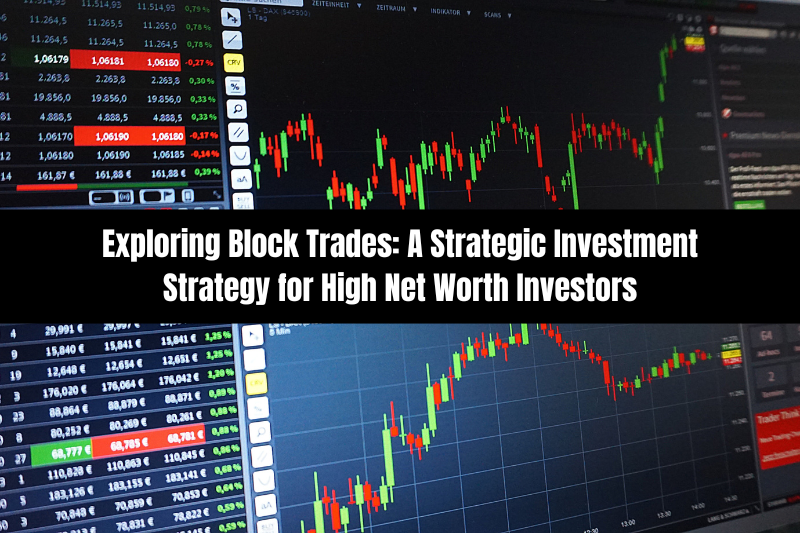In the realm of the stock market, there exists a spectrum of investors, ranging from individual retail participants to formidable institutional entities. Retail investors represent the individuals actively engaged in market activities, while institutional investors, including promoters, high net-worth individuals (HNIs), and both large domestic and foreign investing institutions (DIIs and FIIs), command substantial financial resources, often exceeding significant sums.
These institutional players benefit from privileged access to information about the companies they invest in, setting them apart from their retail counterparts. This informational advantage enables them to conduct high-volume trading, wherein they execute transactions known as block deals or bulk deals. Despite their seemingly interchangeable nature, these terms delineate distinct types of transactions, each with its unique characteristics, which we will delve into within this article.
What Block Deals Signify in the Stock Market?
A block deal denotes a single transaction involving either a quantity of 5,00,000 shares or more, or a value of at least ₹10 crore. Prior to 2017, the minimum value required for a transaction to qualify as a block deal stood at ₹5 crore. However, in 2017, SEBI (Securities and Exchange Board of India) raised this threshold to ₹10 crore.
In contrast to typical trades, block deals do not take place within the regular trading hours for retail investors, which run from 9:15 a.m. to 3:30 p.m. Instead, block deals are executed during specific trading sessions known as block deal windows. As these transactions occur outside of regular trading hours, retail investors do not have visibility of block deals, and the volume traded in a block deal does not reflect on price charts. In the Indian stock market, there are two block deal windows: one in the morning and another in the afternoon, each lasting 15 minutes.
- The morning block deal window is from 8:45 a.m. to 9:00 a.m.
- The afternoon block deal window is from 2:05 p.m. to 2:20 p.m.
Apart from occurring within distinct trading windows, a block deal adheres to the block reference price. Institutions and other participants involved in a block deal have the option to place orders with a premium or discount of 1% (+/-) relative to the block reference price. This reference price differs for each trading session. For the morning block deal window, the block reference price corresponds to the previous trading day’s closing price. Conversely, the block reference price for the afternoon block deal window is determined based on the volume-weighted average price of the stock between 1:45 PM and 2:00 PM.
Finally, it’s important to highlight that any unexecuted or unmatched block deal orders are automatically cancelled and not rolled over to the subsequent trading session. In simpler terms, if a block deal order placed during the morning trading window goes unexecuted, it will be cancelled and not carried over to the afternoon session at 2:05 p.m.
Definition of Bulk Deals in the Stock Market
Bulk deals entail transactions involving a minimum of 0.5% of a company’s total listed shares. Unlike block deals, which have designated trading windows, bulk deals occur during regular trading hours. Consequently, they are visible to all market participants, including retail investors, and the volume traded in a bulk deal is displayed on trading platforms and websites. Additionally, since bulk purchases have an immediate impact on market prices, brokers facilitating these transactions between investors or institutions are required to inform the stock exchanges of various transaction details, including participant identities and the traded volume.
If the value of shares traded in a bulk deal surpasses ₹10 crores, the deal can be executed during block deal trading windows. In such instances, the trader has the option to place the order either during regular trading hours on the stock exchange or during the block deal window. Some investors may opt to place their orders during the block deal window to maintain anonymity during trading hours.
The Influence of Bulk and Block Deals on Prices
Bulk deals exert real-time influence on stock prices, being executed on the exchange’s trading system during regular trading windows. While an individual bulk order may not significantly impact the price, multiple bulk orders can potentially sway it. In contrast, block deals occur in distinct trading windows, leading to no immediate price change.
Nevertheless, both bulk and block deals represent substantial transactions initiated by large institutional investors like hedge funds and mutual fund houses. As previously mentioned, these investors often have access to significant company developments. Consequently, when other investors become aware of a bulk or block deal, the associated stock may attract increased attention. This heightened market interest could result in fluctuations in the stock’s price. However, it’s important to note that this does not guarantee a definitive price movement in any particular direction.
Conclusion
Bulk deals and block deals, despite their unique features, share a commonality in being orchestrated by institutional investors, often referred to as “whales,” within the stock market. This implies that these transactions hold considerable significance in the eyes of both retail and institutional investors alike. Retail investors, in particular, closely observe these deals as they provide valuable insights into the activity of institutional investors, which can serve as indicators of market sentiment and potential stock movements.
However, while bulk and block deals offer valuable information, prudent retail investors understand the importance of not solely relying on this data for making investment decisions. Instead, they recognize the necessity of conducting comprehensive research on the stocks involved. This involves analyzing various factors such as company fundamentals, industry trends, financial performance, and potential catalysts that may impact the stock’s future performance. By adopting this approach, retail investors can make more informed and strategic investment decisions that align with their financial goals and risk tolerance levels.


